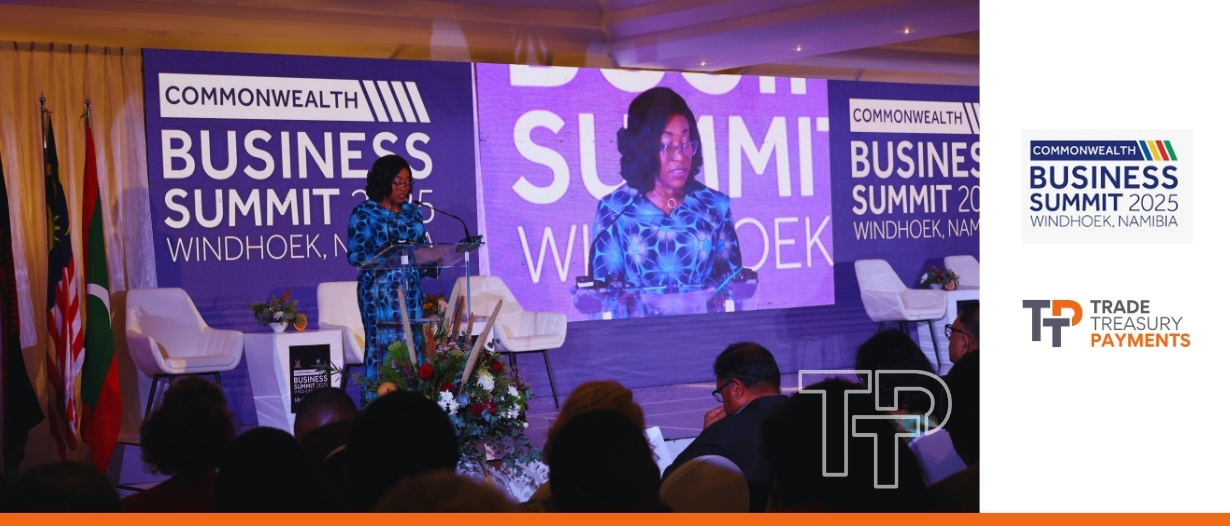First African trade summit charts course for strengthening intra-commonwealth trade with ambitious $2 trillion goal
Devanshee Dave
Jun 19, 2025
 Deepesh Patel
Jun 25, 2025
Deepesh Patel
Jun 25, 2025

At the Commonwealth Business Summit in Windhoek, Namibia, Trade Treasury Payments (TTP) Editorial Director Deepesh Patel sat down for an exclusive interview with Commonwealth Secretary-General Shirley Botchwey to discuss her vision for building trade resilience and driving inclusive economic growth across the Commonwealth.
Secretary-General Botchwey, the first African woman to hold the post, assumed the office on 1 April 2025, bringing more than two decades of experience, notably as Ghana’s Foreign Minister (2017–2024), ECOWAS Council chair, and champion of digitisation and trade-driven development.
Deepesh Patel (DP): This is the first time the Commonwealth Trade Ministers Meeting has been held on African soil. As the new Secretary-General, what does this moment represent for the Commonwealth’s engagement with Africa?
Shirley Botchwey (SB): This moment is more than symbolic; it marks a clear statement of intent. Africa is home to over a third of the Commonwealth’s population and many of its most dynamic, fast-growing economies.
Hosting the Trade Ministers Meeting and the Commonwealth Business Summit here in Namibia for the first time reflects a larger vision of transforming economies and building resilience by targeting the 2.7 billion Commonwealth population as a consumer base driving trade and shared prosperity.
The 21 African member states of the Commonwealth are not just participants in global trade, they are shaping its future. The Commonwealth stands proudly alongside them as true partners in progress.
DP: Trade resilience and diversification have been central themes in Windhoek, especially as tariffs rise and traditional supply chains shift. How can the Commonwealth help its members navigate this new, confusing trade environment?
SB: The world is facing rising protectionism, new tariffs, and shifting alliances, and Commonwealth countries are feeling the pressure. Up to 25% of our exports, about $750 billion, could be at risk.
That’s why we’re not just calling for resilience, we’re building it: through reforms that cut red tape, digital tools that simplify cross-border trade, and new platforms like the Commonwealth Investment Network to unlock finance.
Our goal, however, goes beyond the moment. We are determined to use this teachable moment as an opportunity for the Commonwealth to recognise that intra-Commonwealth trade provides the platform for the resilience and prosperity critical for each Commonwealth citizen to enjoy the democratic dividend.
DP: With only 18% of intra-Commonwealth trade currently within Africa, what’s your vision for strengthening regional trade links and ensuring frameworks like AfCFTA and the Commonwealth work in complement?
SB: There is huge untapped potential. Africa accounts for just 18% of intra-Commonwealth trade, and that must change. My vision is for a Commonwealth that actively supports regional integration, aligning with the AfCFTA rather than duplicating it.
That means investing in trade infrastructure, harmonising digital systems, and helping countries meet shared standards. The Commonwealth’s strength lies in its trust, language, and legal ties, we can use those assets to bring African trade to scale, with African solutions in the lead.
DP: SMEs, women-led firms, and youth entrepreneurs continue to face financing and access barriers. What role do you see for the Commonwealth Secretariat in helping countries unlock capital and opportunities for these groups?
SB: We can’t talk about inclusive trade without tackling access. Women-led businesses, youth entrepreneurs, and small firms are still shut out of capital markets and global value chains. That’s why we’re championing the launch of a Commonwealth Youth Entrepreneurs Fund and expanding our work to help members attract blended finance and scale public-private partnerships.
If we want inclusive growth, we must break down barriers and build systems that work for everyone. But it also means developing the skills of Commonwealth youth, especially in digital education. I am championing the scaling up of distance education to position our youth as entrepreneurs.
DP: From value addition in minerals to digital trade and climate-linked infrastructure, what practical priorities will you champion in your tenure to ensure Commonwealth trade policy translates into real economic opportunity?
SB: For too long, our countries have exported raw materials while importing finished products. That has to change.
Whether it’s value-addition in critical minerals, expanding renewable energy trade, or investing in green infrastructure, our trade policy must drive job creation and industrial growth at home.
I’m also pushing for real progress on digital trade, with model legislation and interoperable systems, so our countries can compete fairly in the digital economy.
DP: You’ve played a key role in Ghana’s regional diplomacy through ECOWAS. How can the Commonwealth better complement regional blocs like ECOWAS to support trade integration, especially in West Africa?
SB: I’ve seen firsthand the power and the challenges of regional integration. ECOWAS, like other blocs, has laid important groundwork. The Commonwealth can add value by supporting implementation, not reinventing structures, but strengthening them. That means helping build regulatory capacity, connecting entrepreneurs to regional markets, and mobilising financing that supports both regional goals and global competitiveness.
An important role that ECOWAS plays is promoting democracy and good governance. These are foundational Commonwealth principles that are key to enhancing trade and investment. In West Africa and beyond, the Commonwealth must act as a bridge and a partner.

Deepesh Patel
Jun 16, 2025
Trade Treasury Payments is the trading name of Trade & Transaction Finance Media Services Ltd (company number: 16228111), incorporated in England and Wales, at 34-35 Clarges St, London W1J 7EJ. TTP is registered as a Data Controller under the ICO: ZB882947. VAT Number: 485 4500 78.
© 2025 Trade Treasury Payments. All Rights Reserved.